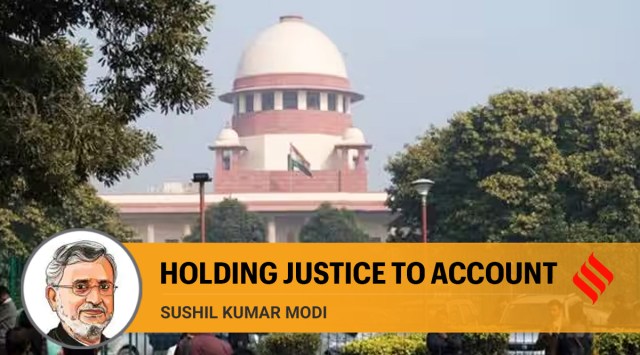- India
- International
Sushil Kumar Modi writes: Judges should declare their assets, too
Parliamentary Standing Committee on Personnel, Public Grievances, Law and Justice came to the unanimous conclusion that anybody holding public office and drawing a salary from the exchequer should mandatorily furnish annual returns of their property, irrespective of the position that person holds
 As far as judges of the Supreme Court and high courts are concerned, there is no provision to declare their assets. However, the Supreme Court, in a full Court meeting held on May 7, 1997, adopted a resolution called "The Restatement of Values of Judicial Life". (File Photo)
As far as judges of the Supreme Court and high courts are concerned, there is no provision to declare their assets. However, the Supreme Court, in a full Court meeting held on May 7, 1997, adopted a resolution called "The Restatement of Values of Judicial Life". (File Photo)
All public functionaries in India are required to furnish the annual return of their assets in one form or another. Service conditions and the Conduct Rules of Civil Servants stipulate the mandatory filing of annual returns of their immovable properties. Other constitutional authorities such as the Comptroller and Auditor General of India have been uploading their latest assets’ declaration on the website under their Code of Ethics. Members of the Council of Ministers also declare their assets as per the Code of Conduct for Ministers issued by the Ministry of Home Affairs. Members of Parliament too are required to furnish information regarding their assets and liabilities within 90 days from the date of their taking the oath and have to notify changes, if any, in the information so furnished by June 30 of that year.
As far as judges of the Supreme Court and high courts are concerned, there is no provision to declare their assets. However, the Supreme Court, in a full Court meeting held on May 7, 1997, adopted a resolution called “The Restatement of Values of Judicial Life”. This resolution lays down certain standards that are to be followed by the judges of the Supreme Court and the high courts. The resolution made it mandatory for every judge of the Supreme Court high courts, including chief justices, to make a declaration of his/her assets and liabilities at the time of appointment and thereafter, at the beginning of every year. Again, a full bench of the Supreme Court, in its meeting on August 26, 2009, decided to disclose assets to the public by putting it on the website of the apex court. However, the same Bench subsequently, on September 8, 2009, resolved to put the declaration of assets voluntarily on the website on or before October 31, 2009. Presently, the website of the Supreme Court shows that only 55 judges have thus far uploaded their assets’ declarations, with the last updation done on March 31, 2018. As far as high courts are concerned, only five have this information on their website and that too only of a few judges.
A significant development took place in 2010, when the government brought in the Judicial Standards and Accountability Bill, to create a statutory mechanism for enquiring into individual complaints against judges of the high courts and Supreme Court and recommending appropriate action, enabling the declaration of assets and liabilities of judges and laying down judicial standards to be followed by them. This Bill intended to replace the Judges Inquiry Act 1968 while retaining its basic features. However, the Bill lapsed on the dissolution of the 15th Lok Sabha and thereafter, the government has not thought it prudent to introduce it again.
The Supreme Court has gone to the extent of holding that the public has a right to know the assets of those standing for elections as MPs or MLAs. By similar logic, judges are also public functionaries, and litigants have every right to know such basic information about them. This will repose the confidence and trust of the litigating public in the judicial system.
Given this context, the Parliamentary Standing Committee on Personnel, Public Grievances, Law and Justice thought it appropriate to take up the matter and deliberated on it in detail. It came to the unanimous conclusion that anybody holding public office and drawing a salary from the exchequer should mandatorily furnish annual returns of their property, irrespective of the position that person holds.

Though the resolution of the Supreme Court on the declaration of assets by judges on a voluntary basis stands even today, it is not widely complied with by judges. So, the Committee felt that the government should bring in appropriate legislation to make it mandatory for the judges of the Supreme Court and high courts to furnish their property returns on an annual basis. This can be done either by bringing suitable amendments to the existing Acts — the Supreme Court Judges (Salaries and Conditions of Service) Act 1958 and High Court Judges (Salaries and Conditions of Service) Act 1954 — with regard to mandatory declaration of Assets and Liabilities or by bringing about separate legislation altogether on the matter. Alternatively, the Supreme Court collegium may devise a suitable mechanism which will require the judges of the Supreme Court and high courts to compulsorily furnish the annual returns of their immovable properties every year.
The writer, former Deputy Chief Minister of Bihar, is a Member of Parliament, Rajya Sabha, from the Bharatiya Janata Party (BJP)
EXPRESS OPINION
More Explained
May 17: Latest News
- 01
- 02
- 03
- 04
- 05









































